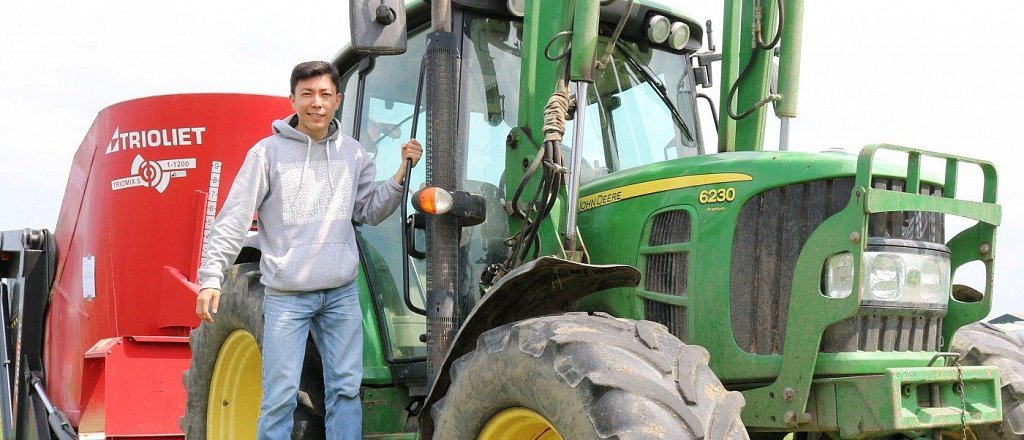Interview for WeProject.media. "Business Case: Askhat Zhanibek on Creating a Startup in Agriculture and Why It's a Promising Business Sector."
How It All Began
I was born and raised in Semey. For over 10 years, I worked in banking, specializing in risk management. Among the business projects I financed were ventures in the agricultural sector. I realized it was an interesting and relevant field, so I pursued further education in this area. I enrolled at Wageningen University & Research, one of the world's leading universities in agriculture.
During my studies, friends and I developed a business project for a monitoring and analytical system for livestock farms. We became winners of the university's StartUp Week 2019 competition.
Upon returning to Kazakhstan, I continued developing the project with initial support from the Netherlands' agrifoodtech accelerator, StartLife.
About the Project
COWMAS's mission is to gather farm data and help farmers derive maximum benefit from it. The goal is to make animal husbandry more sustainable. In English, there's a fitting term for this: "Sustainable," which means economically efficient, environmentally clean, safe, convenient for people, and humane towards animals. Sustainable animal husbandry involves continually balancing farmer satisfaction with growing product demand and reducing the negative impacts of animal husbandry.
We began by auditing farms, identifying their challenges, and assisting with implementing record-keeping systems. Over time, we realized that to scale, we needed to develop an IT platform.
Today, we serve over 15 farms, managing approximately 8,000 head of cattle. We do not have a strategic investor; we self-fund our operations.
In our work with farms, our priority is establishing robust record-keeping systems. This allows us to track the history and development of each animal, as well as the interventions performed. Proper record-keeping helps solve numerous issues, leading to increased livestock output and safety. For example, on one farm, we increased calf survival rates from 64% to 89%, and on another, from 35% to 70%.
Business Specifics in Agriculture
The COWMAS project has been operational for over three years. During this time, we've made many mistakes and tested various hypotheses. One such hypothesis was developing intelligent sensors—ear tags for cattle—that tracked geolocation and health status. However, we realized that the commercial profitability would be low, and it wasn't yet of interest to Kazakhstani livestock farmers. Lesson learned: we must consider the technology's cost and its value to the customer. The farmer's investment in adopting and using the product should not exceed the total benefits derived from its application.
Agriculture is an interdisciplinary field. To build a successful business, you'll need the expertise of various specialists who can approach problems from different angles.
Animal husbandry is a large and fascinating subsector of agriculture that is embracing new technological developments. In developed countries, one of the main challenges is resource efficiency—finding ways to produce more from limited resources. Environmental issues also come to the forefront.
In developing countries, the main challenges are different: often, there are issues with veterinary care and biological safety, low animal productivity, underdeveloped infrastructure, fragmented supply chains, non-compliance with livestock farming practices, and high cost of borrowing capital. Therefore, before introducing products to the market, it's essential to understand the target audience and local issues.
We conducted calculations for a business related to large cattle in meat livestock farming. For instance, to achieve effective growth on a small breeding farm with 100 head of breeding stock, approximately 80 calves are needed. In European countries, this figure exceeds 90 calves. In Kazakhstan, it stands at 50-60%. On average, each such small farm in the country misses out on 20 calves per year. There are more than 14,000 such farms. The cost of a calf is 200,000 tenge. Consequently, Kazakhstan loses over 120 billion tenge annually due to efficiency issues. Therefore, there is a significant need to address fundamental farming problems that impact overall economic efficiency and align with global industry standards.
On Plans
The main medium-term goal is to attract a strategic investor. Then, we will scale our experience. Farming varies everywhere, even within one country. Therefore, it's not enough to have one product — it needs constant adaptation to local needs.
Recommendations
Research the market you plan to enter. Identify the needs of potential customers. Learn about existing competition, both direct from other companies and indirect. Perhaps farmers find it easier to perform certain actions manually than to purchase technology. Under specific external conditions, it might be easier for them to write off production resources or their product as losses rather than trying to preserve it.
Address real issues. Get out in the field. Ask people what concerns them. Share your capabilities and learn how you can help.
Build your network. Agriculture is a specific industry. There are several key stakeholders interested in development. Get to know them and observe how interactions unfold in the market.



